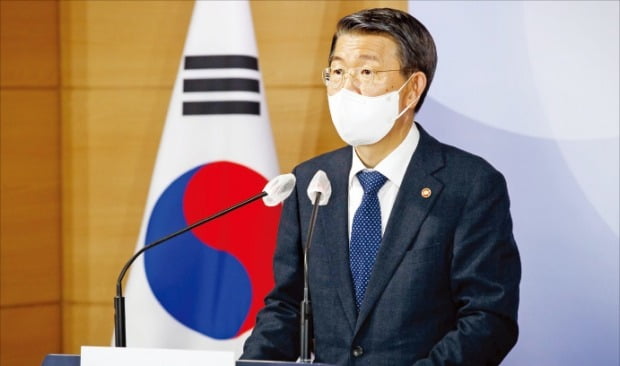
Finance Commissioner Eun Seong-su announced on the 3rd at the government office in Seoul that “short selling of 350 stocks belonging to the KOSPI 200 and KOSDAQ 150 indexes will resume from May 3”. Provided by the Financial Services Commission
The government pulled out a’partial resumption’ card for short selling, which has been considered the biggest issue in the stock market since the beginning of this year. For small-cap stocks with a high proportion of individual investors, the Hong Kong-style model was selected, which allowed short-selling of mid- and large-cap stocks while maintaining a ban on short selling. The financial investment industry is in a welcoming atmosphere. This is because the resumption of short selling of large-cap stocks was nailed on May 3 despite strong opposition from individual investors. It is an evaluation of’courageous compromise plan’. It was the global standard that was put forward for that reason.

“Short selling controversy ends”
Finance Commissioner Eun Seong-soo emphasized’resolve uncertainty’ several times while announcing measures to extend the ban on short selling and resume partial resumption at the government office in Seoul on the 3rd.
Chairman Eun said, “As the chairman of the Financial Services Commission, I felt sorry and regretted that various points and controversies have been raised, such as’The Financial Services Commission does not talk quickly.’ It would be great to put an end to the controversy over short selling.”
Initially, it was observed that both inside and outside of the financial authorities and politics would decide whether to resume short selling after the Lunar New Year holiday. However, the Financial Services Commission held an extraordinary meeting on the same day and decided on a short sale agenda. It can be interpreted as reflecting the strong will of the government and the ruling party that’short selling should not lead to controversy anymore.’
Resume from large stocks
The Financial Services Commission decided to resume short selling of 350 mid- and large-cap stocks belonging to the KOSPI 200 and KOSDAQ 150 from May 3rd. The two indices were indexed by the Korea Exchange by selecting stocks with high market capitalization and high trading volume based on market representation, liquidity, and industry representation among stocks listed on the securities and KOSDAQ markets.
It consists of stocks representing the domestic stock market, including Samsung Electronics (KOSPI 200), which is the number one market capitalization in the securities market, and Celltrion Healthcare (KOSDAQ 150), which is the number one market capitalization in the KOSDAQ market. In the case of the KOSPI 200 index, the share of the number of stocks is only 22%, but the market cap is 88%. The share of KOSPI 200 constituents in the stock market short selling balance amounts to 94.4%.
An official in the financial investment industry said, “In fact, from May 3rd, short selling in the domestic stock market should be viewed as fully resuming.”
Why Hong Kong
This short selling method is similar to the’designation system for short selling stocks’ in Hong Kong. Hong Kong completely banned short selling, but since 1994, it has implemented a system of designating possible stocks in the process of gradually allowing short selling. As of October 2019, short selling of 710 stocks and 230 fund stocks, which is 37% of the total 1900 stocks, is allowed.
However, the KOSPI 200 index and the KOSDAQ 150 index are somewhat different from the Hong Kong-style system in that constituents are automatically reselected every half year (June/December). The exchange has selected constituent stocks based on market capitalization at the end of April and October by 11 industry groups, and has been operating the index according to the changed stocks after two weeks of disclosure.
The Financial Services Commission decided to broaden private short selling investment opportunities in order to relieve individuals’ distrust that short selling is a’sloping playground’ to foreigners and institutions. First of all, Korea Securities Finance will expand and reorganize the individual lending system, which bears settlement risk, so that individuals can stably borrow stocks to sell shortly. It is predicted that from May 3rd, individual short selling will be possible in most of the stocks that make up the KOSPI 200 and KOSDAQ 150, as it has secured the current 2~3 trillion won of large stocks.
However, as short selling is a’high-risk investment’ with an infinite loss rate in theory, a protective device has been prepared. Prior training and simulated investments for short-selling investors are mandatory. The initial investment limit was limited to 30 million won.
If the number of short selling in the last two years exceeds 5 and the accumulated borrowing amount is over 50 million won, the investment limit is raised to 70 million won. It was decided not to place a limit on borrowing for individual professional investors with more than two years of experience in short selling.
Individuals still oppose the resumption of short selling. According to the Financial Services Commission’s policy to resume short selling, the Korean Stock Investors Association (Han Tu-yeon), an individual investor group, expressed its intention to continue the struggle against the government, saying that it is only a measure for election. CEO Jeong Eui-jeong, Han Too-yeon argued, “It is just a lame countermeasure in which the short-selling forces cannot break the structure of taking personal investor property easily.”
Reporter Oh Hyeong-joo [email protected]
